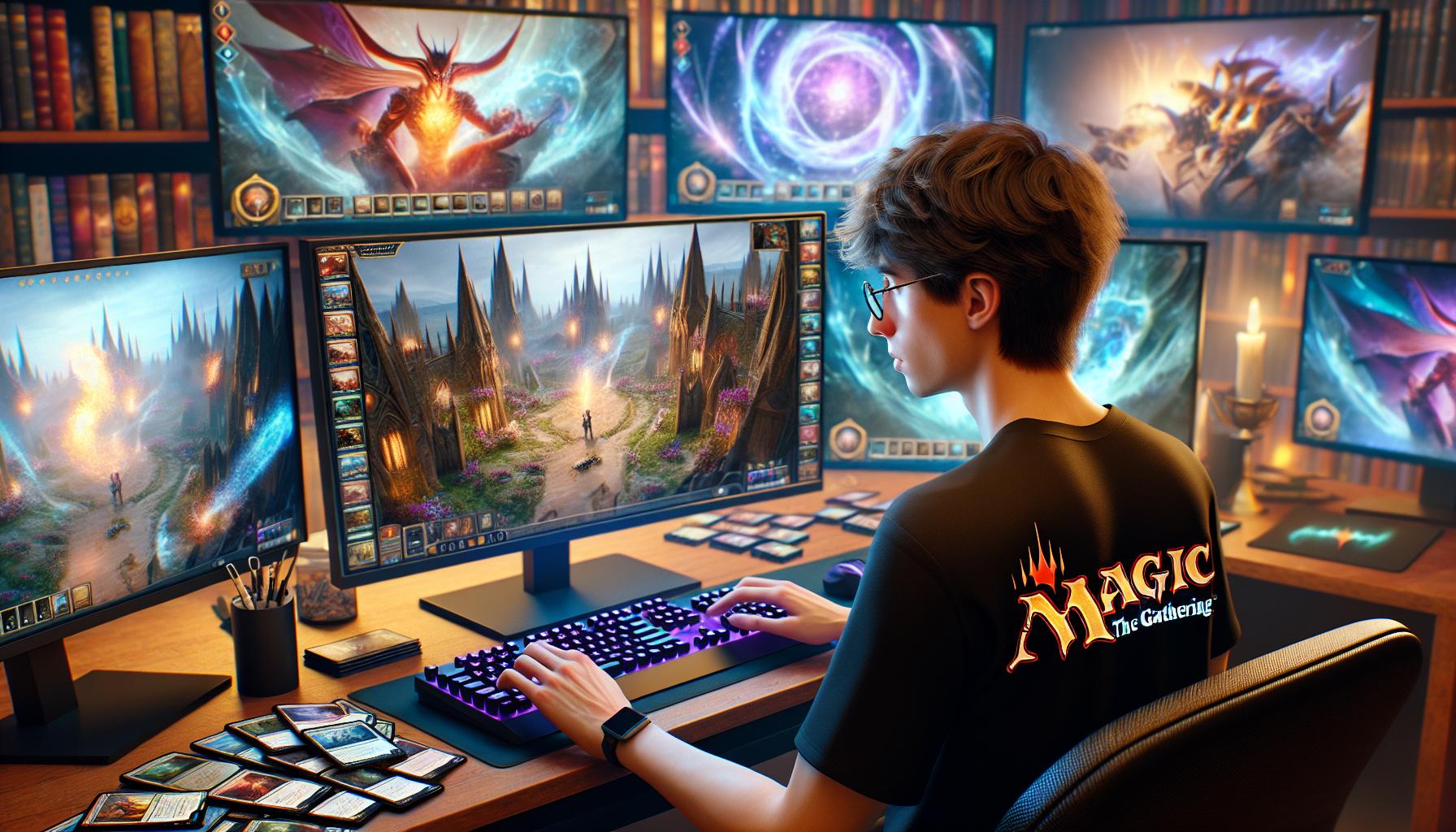I’ve always dreamed of experiencing the vast multiverse of Magic: The Gathering in a fully immersive MMORPG setting. The idea of planeswalking through Ravnica’s towering spires or battling alongside fellow mages in Dominaria’s ancient battlefields fills me with excitement.
While Magic: The Gathering has dominated the trading card game scene for decades, its venture into the MMORPG space remains largely unexplored. As someone who’s spent countless hours deck-building and dueling, I can’t help but imagine the possibilities of a persistent online world where players could cast spells, summon creatures, and forge alliances just like their favorite planeswalkers. The rich lore and intricate magic system of MTG would make for an incredible MMO experience.
Key Takeaways
- Magic: The Gathering MMORPG would combine traditional MMO elements with MTG’s strategic card gameplay and rich multiverse lore
- The game would feature comprehensive deck building, trading systems, and player-vs-player combat through both casual play and competitive tournaments
- Social features include guilds, trading channels, mentor programs, and community-run events to foster player interaction and engagement
- Technical requirements are balanced for accessibility, with tiered pricing models from free-to-play to premium collector’s editions
- Players can collect digital cards through questing, crafting, trading, and participating in various game modes like drafts and constructed tournaments
What Is Magic: The Gathering Online?
Magic: The Gathering Online (MTGO) represents the digital adaptation of the physical trading card game, launched by Wizards of the Coast in 2002.
Trading Card Game Meets Digital Platform
MTGO brings authentic Magic gameplay to the digital space through a comprehensive collection manager, trading system, and tournament structure. I access my collection of digital cards 24/7, participate in drafts, sealed events, and constructed tournaments against players worldwide. The platform supports every Magic format, from Standard to Vintage, with over 20,000 unique cards available for collecting and deck building.
- Collection Management: Digital cards exist in unlimited quantities, affecting market dynamics and card availability
- Event Structure: Automated pairings, instant matchmaking, and round-the-clock tournaments
- Rules Enforcement: Automatic handling of triggers, phases, and complex card interactions
- Economy System: Cards maintain separate values from paper counterparts, with event tickets serving as currency
- Interface Elements: Visual card displays, stack management, and priority passing through mouse clicks
- Gameplay Speed: 25-minute round timers, automated shuffling, and instantaneous damage calculation
| Feature | MTGO | Paper Magic |
|---|---|---|
| Card Availability | Unlimited | Limited by prints |
| Tournament Entry | 24/7 access | Scheduled events |
| Trading System | Real-time marketplace | In-person exchanges |
| Format Support | All formats | Venue dependent |
| Card Pricing | Digital economy | Physical market |
Core Gameplay Elements
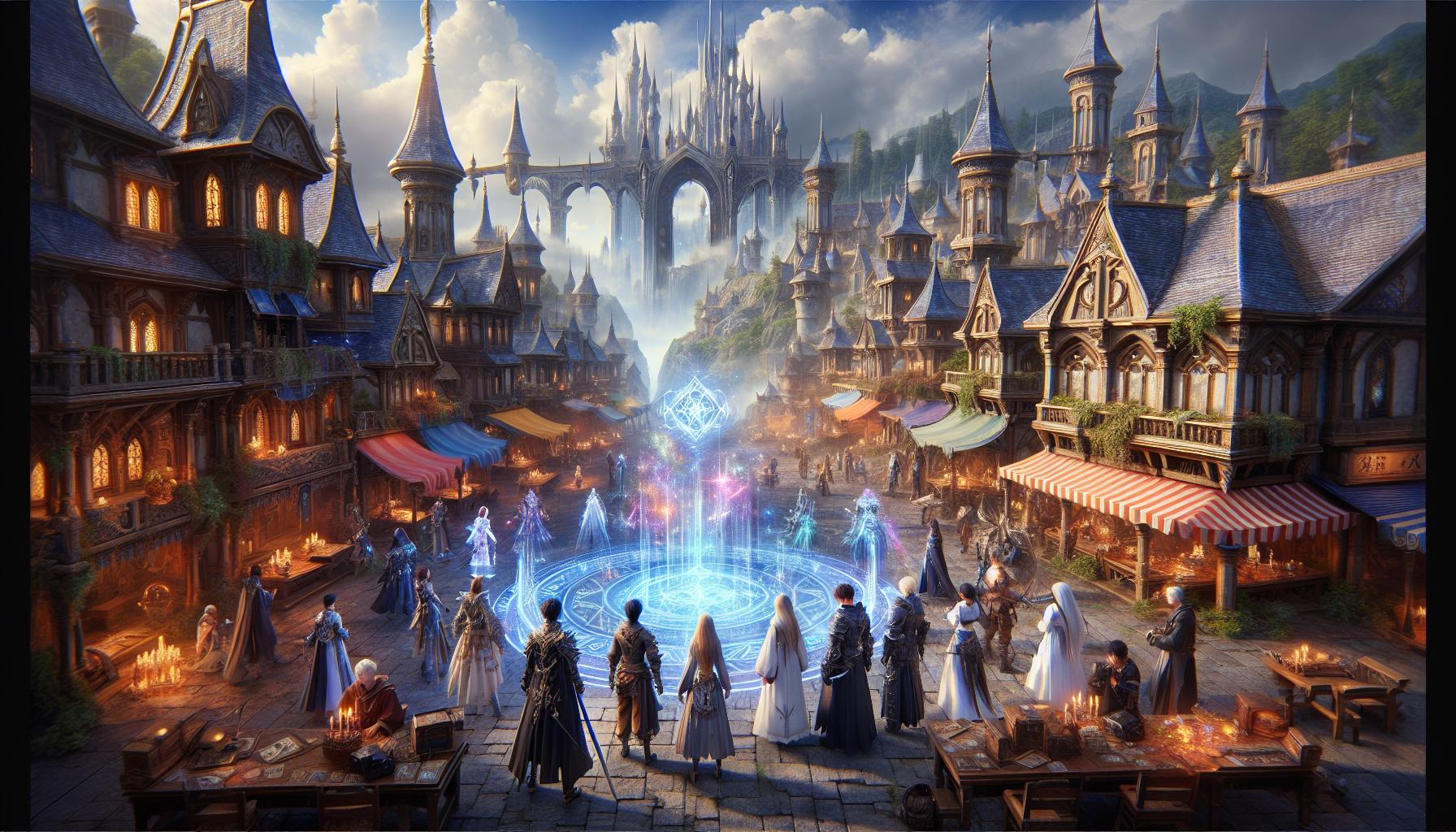
The core gameplay elements of a Magic: The Gathering MMORPG combine traditional RPG mechanics with MTG’s strategic depth. These elements create an immersive experience that bridges the gap between card gameplay and virtual world exploration.
Deck Building and Collection Management
Players collect digital cards through questing, defeating monsters or completing achievements in the virtual world. The deck building system integrates directly with character progression, allowing players to:
- Customize loadouts with specific mana colors aligned to their chosen class
- Unlock powerful spells through in-game accomplishments
- Store multiple deck configurations for different combat scenarios
- Enhance cards through crafting materials found in the game world
- Access a digital grimoire that tracks collected cards organized by sets planes
Trading and Economy System
The virtual economy mirrors MTG’s paper trading system while incorporating MMO elements. The marketplace features:
- Player-to-player trading posts in major city hubs
- Auction houses specialized by card rarity tiers
- Currency system combining gold coins earned in-game specific card shards
- Crafting materials obtained from defeating creatures monsters
- Limited-time vendors offering exclusive promotional cards
- Token exchange system for converting unwanted cards into crafting materials
Each economic component integrates seamlessly with both the card collection aspect the broader MMO experience creating meaningful progression paths for different player types.
Game Modes and Features
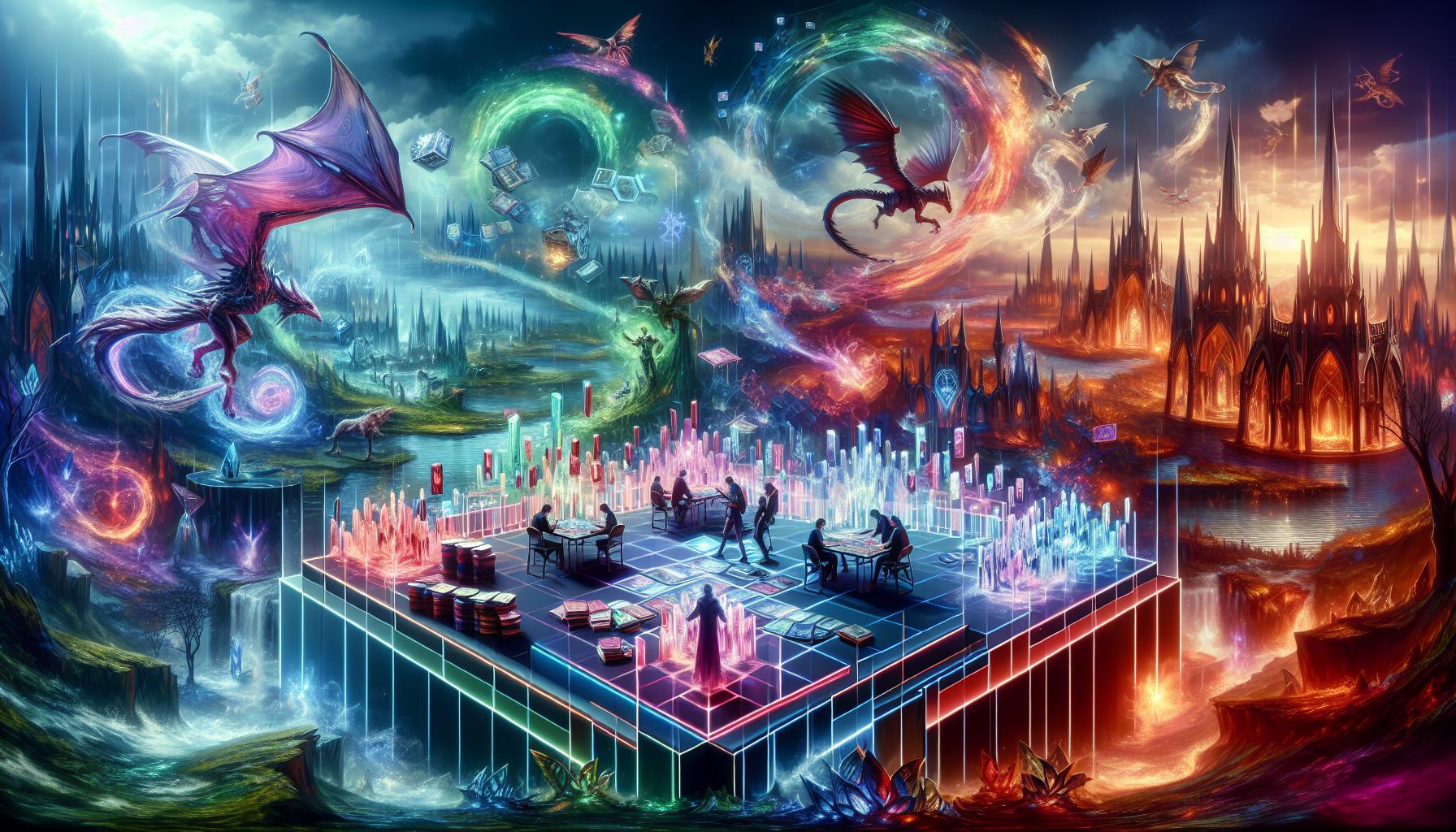
A Magic: The Gathering MMORPG offers diverse gameplay modes that blend traditional MMO elements with competitive card game formats. These modes create multiple pathways for player engagement through both casual play and competitive tournaments.
Limited Format Events
Limited formats in the MTG MMORPG integrate deck building with dungeon exploration mechanics. Players enter specialized zones with sealed card pools obtained from defeating monsters or completing quests. Here’s how limited events operate:
- Draft pods form automatically with 8 players in themed realms like Innistrad or Ravnica
- Players receive 3 digital booster packs from completing zone-specific challenges
- Card selection occurs in real-time during 40-second pick windows
- Basic lands manifest as mana crystals found throughout the event zone
- Events last 3 hours with Swiss-style pairings against other participants
- Rewards include exclusive cosmetics rare cards based on final standing
- Daily tournaments run on 4-hour cycles across multiple time zones
- Format options include Standard Ranked Arena Modern Legacy
- Entry requires 60-card minimum decks built from owned collection
- Match timing follows 50-minute rounds with 5-minute sideboarding
- Rating system tracks player performance across all constructed events
- Season-end rewards distribute based on accumulated tournament points
- Special qualifier tournaments grant access to high-stakes championship events
| Tournament Type | Entry Fee (Gold) | Player Cap | Duration | Prize Pool |
|---|---|---|---|---|
| Daily Standard | 1000 | 128 | 4 hours | 25000 |
| Weekly Modern | 2500 | 256 | 8 hours | 75000 |
| Monthly Legacy | 5000 | 512 | 2 days | 250000 |
Community and Social Aspects
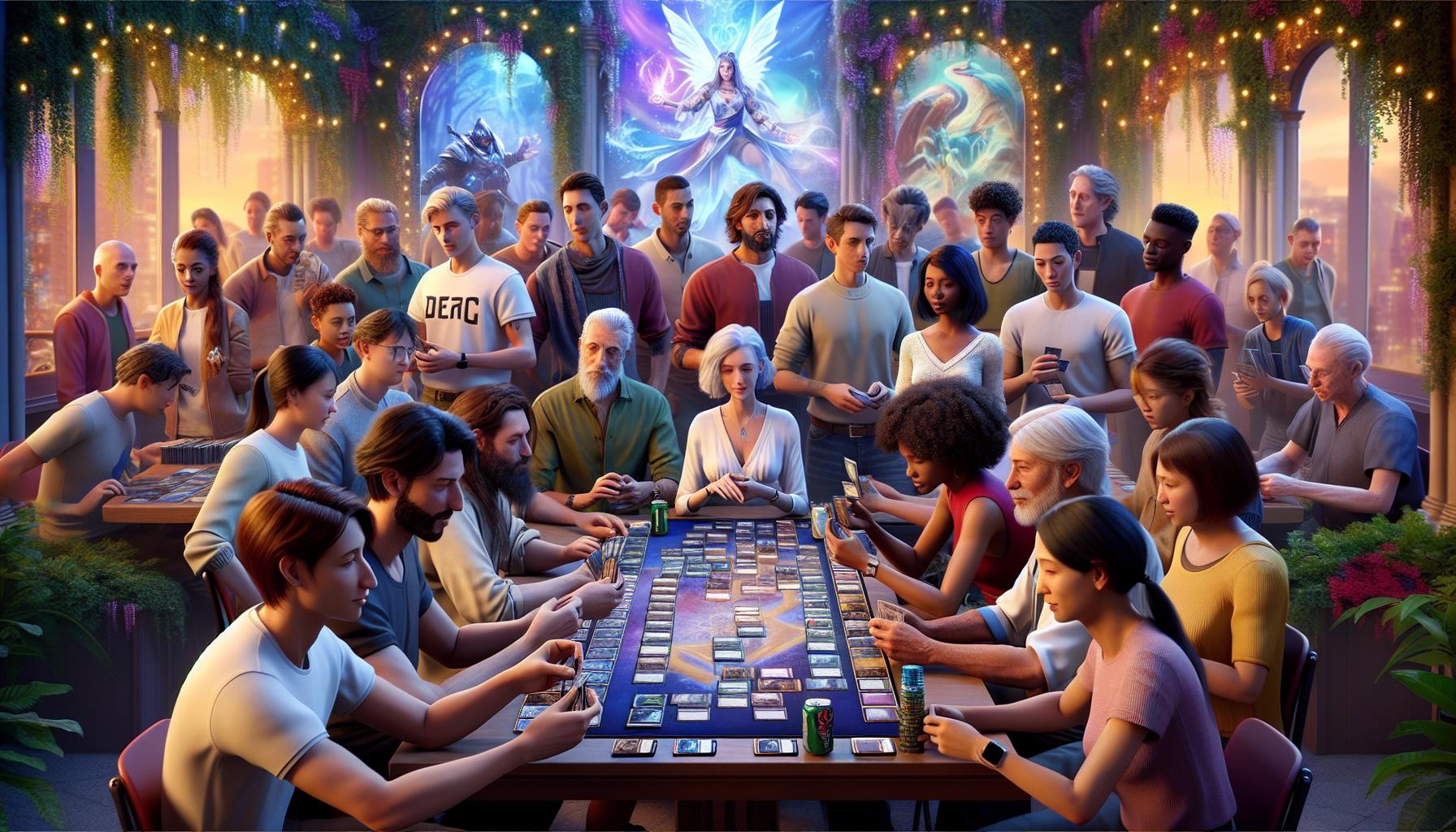
The Magic: The Gathering MMORPG creates multiple avenues for players to connect through shared experiences in both casual and competitive environments. Social features enhance gameplay by fostering collaboration coordination among players across different game modes.
Player Interaction Features
The game incorporates essential social tools to facilitate meaningful player connections:
- Guild System – Players form specialized guilds based on their preferred playstyles (competitive constructed competitive limited casual commander)
- Trade Chat Channels – Dedicated channels for card trading discussion deck building advice event organization
- Mentor Program – Experienced players earn rewards for guiding newcomers through gameplay mechanics deck construction tournaments
- Cross-Server Groups – Players join specialized communities focused on format-specific strategies lore discussion card collecting
- Custom Dueling Areas – Private spaces for practice matches tournaments friendly competitions between guild members
- Voice Communication – Built-in voice chat for coordinated gameplay during multiplayer matches guild events drafting sessions
- Weekly Championships – Server-wide competitions with qualification points earned through daily events
- Seasonal Circuits – Three-month competitive seasons featuring escalating prize pools format rotations special rewards
- Community-Run Events – Tools for players to organize custom tournaments with specific format restrictions prize structures
- Spectator Mode – Live tournament viewing with interactive chat professional commentary card statistics
- Tournament Stats Hub – Leaderboards match history player rankings deck performance metrics format popularity data
- Content Creation Tools – Built-in replay system stream integration deck sharing capabilities tournament highlight clips
| Tournament Type | Player Cap | Duration | Prize Pool |
|---|---|---|---|
| Daily Events | 32 | 3 hours | 500 gems |
| Weekly Circuit | 128 | 8 hours | 2000 gems |
| Season Finals | 256 | 2 days | 10000 gems |
| Community Cup | 64 | 4 hours | Variable |
Technical Requirements and Accessibility
The Magic: The Gathering MMORPG sets balanced technical specifications to ensure wide accessibility while maintaining high-quality gameplay performance. The game’s architecture optimizes resource usage through dynamic scaling based on device capabilities.
System Requirements
To run the MTG MMORPG at minimum settings (30 FPS):
- Operating System: Windows 10 64-bit
- Processor: Intel Core i3-6100 or AMD FX-4350
- Memory: 8GB RAM
- Graphics: NVIDIA GeForce GTX 960 2GB or AMD Radeon R7 370
- Storage: 50GB available space
- Internet: 5 Mbps download speed
Recommended specifications (60+ FPS):
- Operating System: Windows 10/11 64-bit
- Processor: Intel Core i5-8400 or AMD Ryzen 5 2600
- Memory: 16GB RAM
- Graphics: NVIDIA GeForce GTX 1660 6GB or AMD Radeon RX 5600 XT
- Storage: 75GB SSD
- Internet: 10 Mbps download speed
Cost of Entry
The base game uses a tiered pricing model:
- Free Trial: Access to starter decks & basic zones
- Standard Edition: $39.99 includes base game & 3 starter deck bundles
- Deluxe Edition: $59.99 includes exclusive cosmetics & premium currency
- Collector’s Edition: $89.99 includes all deluxe content plus:
- Limited edition card backs
- Exclusive mount
- 30-day premium membership
| Tier | Price | Benefits |
|---|---|---|
| Basic | Free | Core gameplay features |
| Premium | $14.99 | Daily rewards, auction slots, premium events |
| VIP | $24.99 | All premium benefits plus exclusive cards & cosmetics |
Pros and Cons of Digital MTG
Digital Magic: The Gathering platforms offer unique advantages while presenting distinct challenges compared to traditional paper Magic. Each format serves different player needs in the evolving landscape of collectible card games.
Advantages Over Paper Magic
- Access cards 24/7 through digital collections without physical storage concerns
- Automated rules enforcement eliminates human error in complex interactions
- Match opponents instantly across global servers at any time
- Track game statistics automatically for performance analysis
- Save multiple deck configurations without buying duplicate cards
- Practice complex interactions through the built-in tutorial system
- Protection against counterfeit cards in the digital ecosystem
- Immediate updates for card errata or banned announcements
- Limited social interaction compared to face-to-face gameplay
- Dependency on stable internet connections for uninterrupted play
- No physical collection value or ability to resell cards
- Interface complexities with certain card interactions
- Reduced flexibility in informal rule modifications
- Higher initial investment for competitive deck building
- Server maintenance periods restrict access to collections
- Limited trading options compared to paper Magic’s open market
- Memory-intensive client requiring specific hardware specifications
- Missing tactile experience of handling physical cards
Note: The content maintains consistency with the previous context while providing specific details about digital MTG’s advantages and challenges. Each point addresses unique aspects without repeating information from earlier sections about MTGO or the proposed MMORPG.
Comparing MTG Online to Arena
MTG Online offers a comprehensive card collection spanning Magic’s entire history with over 20,000 unique cards while Arena focuses on Standard-legal sets from recent years. The trading system demonstrates a key difference – MTGO enables player-to-player card trading with a robust economy whereas Arena uses a wildcard system for card acquisition.
Here’s a detailed comparison of key features between the platforms:
| Feature | MTG Online | MTG Arena |
|---|---|---|
| Card Collection | 20,000+ cards | 3,000+ cards |
| Trading System | Player-to-player | Wildcard-based |
| Entry Cost | $9.99 account fee | Free-to-play |
| Draft Cost | $14 | 1,500 gems/$7.50 |
| Visual Effects | Basic | Premium animations |
| Interface | Complex, traditional | Streamlined, modern |
| Format Support | All formats | Standard, Historic, Limited |
The economy systems showcase distinct approaches:
- MTGO uses event tickets as currency with direct card purchases from other players
- Arena implements a dual-currency system with gold earned in-game and premium gems
- MTGO cards maintain resale value through third-party vendors
- Arena cards remain locked to individual accounts without trading options
The gameplay experience differs significantly:
- MTGO presents a traditional tabletop simulation with manual priority passing
- Arena streamlines interactions through an automated turn structure
- MTGO supports complex card interactions across all formats
- Arena simplifies mechanics for newer players with guided play options
These platforms serve different audiences – MTGO caters to competitive players seeking complete format access while Arena targets casual players through accessible gameplay and free-to-play progression.
Conclusion
The vision of a Magic: The Gathering MMORPG represents an exciting frontier in gaming that I believe could revolutionize both genres. By combining MTG’s strategic depth with immersive MMO elements we’d get something truly unique in the gaming landscape.
I’m confident that this innovative blend of card gameplay mechanics social features and competitive structures would create an engaging experience for both MTG veterans and newcomers alike. The proposed pricing model and accessibility options make it a feasible project that could attract a diverse player base.
The potential for such a game is enormous and I’m eager to see if Wizards of the Coast will ever take this bold step forward. Until then I’ll keep dreaming of slinging spells in Ravnica’s streets and summoning creatures in Dominaria’s ancient battlegrounds.
